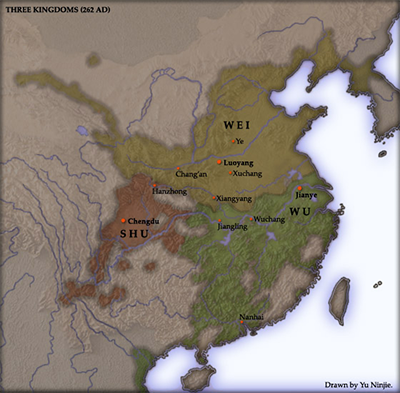The Three Kingdoms Period in China
By the time that the Han Dynasty dissolved, China was in a period of turmoil. Contributing to the lack of a strong central entity was the rise in power of several strong warlords. For more than a century, these leaders and their descendants strove for overall influence in the Middle Kingdom. 
Three of the most prominent of these tribes were the Shu, Wei, and Wu. Many historians call this time the Three Kingdoms period, despite the fact that the leaders proclaimed themselves emperors. The Wei, founded by Cao Pi, held sway north of the Yangtze River; in the south, the Shu dominated the west and the Wu dominated the east. Founding the Shu and the Wu were Liu Bei and Sun Quan, respectively; those two led the armed force that defeated Cao Cao, who had taken control of the army and attempted to rule the country as well. Cao Cao had set aside then-Han Emperor Xian; after his defeat at the Battle of Red Cliffs, in 208, Cao Cao and Xian retreated to the north. In 220, Cao Cao died and his son Cao Pi forced Xian to cede power and eventually declared himself the head of the Wei Kingdom. The following year, Liu Bei named his kingdom Shu Wan and Sun Quan named himself the King of Wu. Thus began the Three Kingdoms Period. No one kingdom had the upper hand for much of the next few decades. Cao Pi and his descendants controlled much of the north and got the better of the Shu Wan Kingdom but lost control in 266, when Sima Yan assumed preeminence and declared the Jin Dynasty. Of the Three Kingdoms, the Wu held out the longest, succumbing to Jin forces in 280. This period in Chinese history is perhaps most well-known because of The Romance of the Three Kingdoms, a 14th-Century historical fiction work written by Luo Guanzhong. Also in the literary realm, Cao Cao and a few of his sons, including Cao Pi, wrote poems and literary criticism. Another well-known work, in the nonfiction area, is Records of the Three Kingdoms, a 3rd-Century history text compiled by Chen Shou. |
|




